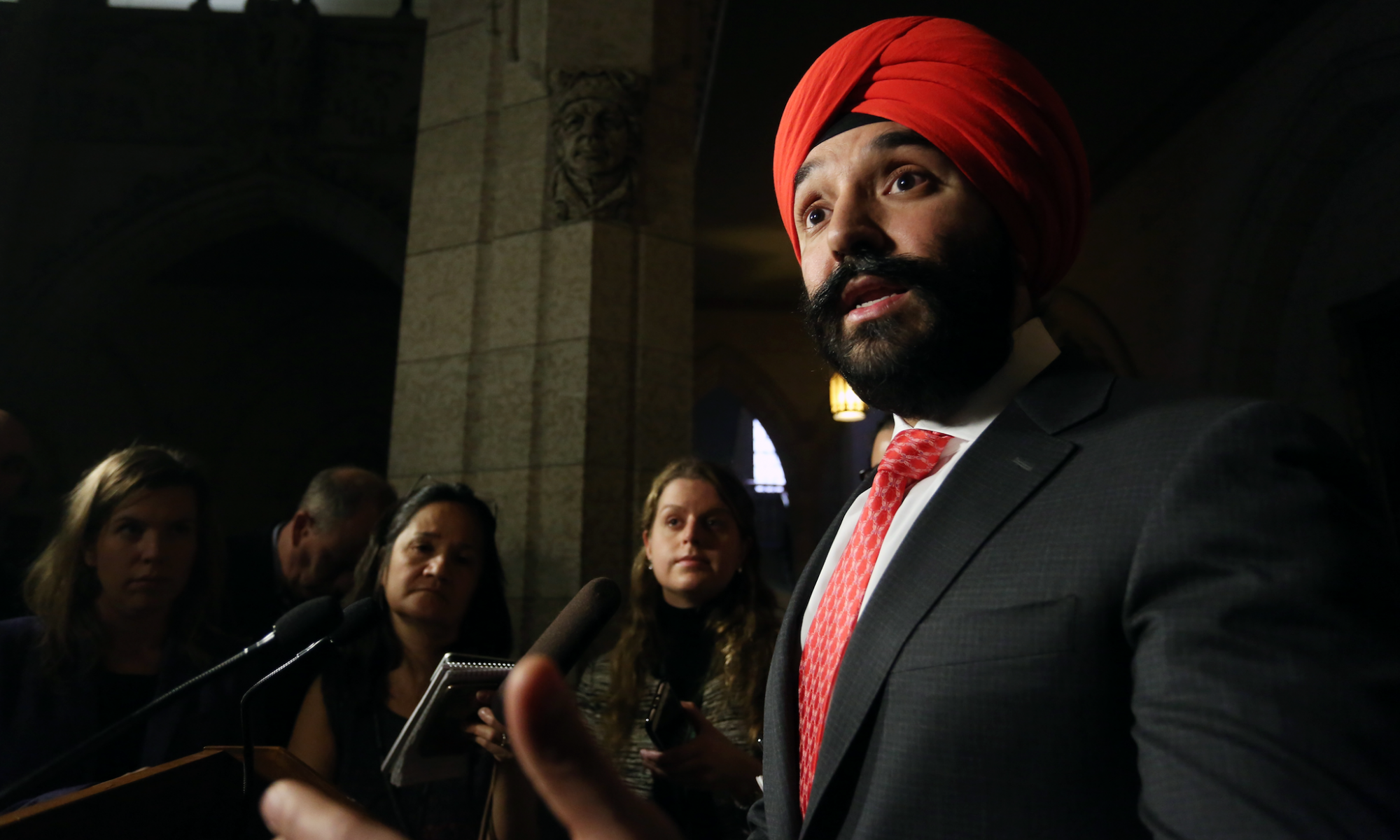The federal government will focus on 2 GB to 6 GB post-paid plans from Rogers Communications Inc., Telus Corp. and BCE Inc. in its efforts to lower Canadian wireless prices, and set-aside 50 MHz of 3500 MHz spectrum for smaller and regional players in most licence areas in the upcoming Dec. 15 auction.
Innovation Minister Navdeep Bains said in a phone interview that the government chose to target “mid-range” plans because its annual report on wireless prices — also released Thursday — showed they haven’t seen a significant pricing decline, as has been the case for low-end and high-end plans. The report showed that prices for plans with 10 GB of data dropped by 31 per cent last summer, for instance.
“We’re confident that this price reduction will also have an impact on other prices as well,” he said.
The 2 to 6 GB range means the plans effectively target flanker brands; currently, the big three’s premium brands’ websites advertise only plans with larger or unlimited data allotments. Plans with data caps in the government-targeted range are sold by their flanker brands, Fido, Chatr, Virgin, Lucky, Kodoo and Public Mobile. According to the CRTC’s annual report, the big three held 89.2 per cent of the market; their flanker brands account for 27.2 per cent of that in 2018.
The issue of how the big three keep their flanker brands separate from their main brands, with separate stores in many cases, and websites that make no mention of the other brands, became an issue at the CRTC’s wireless hearing late last month. Commissioners said a CRTC survey showed Canadians appeared to be uncertain who owns the flanker brands, which could lead to customers loyal to the main brand or mistakenly worried about quality or coverage of flanker brands’ networks to overpay when a flanker brand would actually be a better fit for their needs.
When asked whether he was concerned that Canadians would end up overpaying because they’re not aware the flanker brands are owned by the Rogers, Bell and Telus, Bains said the government would have a “clear transparency mechanism in place” when it rolls out the plan, which will report on progress of the 25-per-cent reduction quarterly for each of the big three’s plans, with information collected by Statistics Canada. “This transparency measure will bring to light some of those issues around networks as well,” he added.
Bains also said the government will “look at consumer awareness-related measures as well to make sure that they understand what options they have… what plans exist, so they can make the best choices possible.” He said the specifics of what those consumer awareness measures will look like would be determined at a later date.
“When we come out with the first quarterly report we’ll see what feedback we’re getting from customers,” he outlined.
The prices will be benchmarked from “early 2020,” meaning prices have to fall by 25 per cent from where they were then in the next two years. The drop will apply to post-paid, bring-your-own device plans with unlimited talk and text as they are advertised on company websites, and the government will track prices on a quarterly basis. If they do not drop in the time specified, the government will “look at additional competitive measures” such as how spectrum is rolled out in the future or mandating mobile virtual network operators, Bains said.
When the Liberals first announced they would look to reduce prices, they indicated the first step in doing so would be to ask industry to lower prices voluntarily. The big three have been meeting with the government since the election to talk about the government’s promise. Bell and Telus, though not Rogers, have since made it clear they wanted the plans benchmarked from before prices fell with the emergence of “unlimited” plans in the summer of 2019.
While the government did not agree on that official benchmark date, its choice to target mid-range plans means the “unlimited” plans that emerged in that summer are exempt from the new requirements.
In response to a question about input from industry, Bains said “we made a commitment to Canadians and we wanted to follow through on that commitment, and we were engaging with them to explain the importance of why this was essential from the government’s affordability agenda.”
When asked whether the companies’ feedback was reflected in the design of the plan, for example, to only target mid-range plans, Bains responded the decision to target 2 to 6 GB plans was a reflection of the Wall report. “What we’re doing is following through on the platform commitment,” he said.
The CRTC’s latest annual report, which covers 2018, showed the average data use was 2.1 GB. Data consumption rates have been growing in recent years, and are likely to increase even more once 5G is launched.
Bains said that the government “looked at the current consumption rate for Canadians… this 2 to 6 [GB] range falls within that current consumption rate, and if you bake into account future usage rates it’s still relevant,” he said. “We’re confident that this price reduction will also have an impact on other plans as well.”
The government also released details about the upcoming 3500 MHz auction Thursday, which it said will begin Dec. 15, 2020. It will include set-asides of 50 MHz for “small and regional companies” in areas where there is spectrum available.
“Eligibility to bid on set-aside spectrum will be limited to those registered with the CRTC as facilities-based providers that are not national mobile service providers but are actively providing commercial telecommunications services to the general public in the relevant Tier 2 service area of interest,” a backgrounder document outlined.
Last year, it announced it would claw back a portion of the spectrum from current users for the auction, and allow existing holders of the 3.5 GHz to apply for new flexible licences based on how much they currently hold.
That means the full 50 MHz will be available for set-asides in 138 licence areas out of a total of 172 Tier 4 areas, Innovation, Science and Economic Development officials said in a technical briefing.
In other areas, there will be no set-aside because the presence of existing service providers means there is only a limited amount of spectrum available. Of those 34 areas, 30 are more rural and have more existing licensees providing service. They won’t have a set-aside “because we wanted to have maximum opportunity for as many people as possible to bid on the spectrum,” an official said.
Officials said that they opted not to use the new, even smaller, Tier 5 areas, which divide the country into 654 geographic areas, because having so many licences makes it challenging from an engineering perspective to coordinate at the borders, and because it would significantly increase the complexity of the auction.
Despite threats by Bell, Rogers and Telus at last month’s CRTC wireless hearing that they would cut network investment, especially in rural areas, if the regulator mandated MVNOs, Bains said in the interview he was “confident that we will see significant investments going forward.”
“They can speak to what their operational challenges are, they can speak to their investment strategies,” he said.
“My observation has been that we’ve put forward progressive tax policy, there’s low debt financing options, we’ve de-risked some of the key investments for internet connectivity in rural and remote communities, and because of our competitive measures, we’re seeing investments go up, not down, and we’re confident that our policies are enabling us to ensure high quality networks for internet and wireless services.”
— With reporting by Anja Karadeglija at akarad@thewirereport.ca and editing by Adam Langenberg at alangenberg@thewirereport.ca



